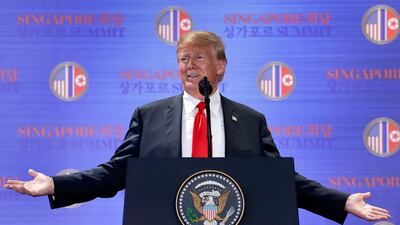Earlier this month, publishers Simon & Schuster announced they had printed one million copies of Fear: Trump in the White House, Bob Woodward's account of the first year or so of Donald Trump's time as President of the United States. I have no doubt that all those copies will be quickly snapped up – few political books have been the subject of such feverish anticipation – and many more besides (Fear is already the fastest-selling title since 2015). But I do wonder how many will be read.
For all its extraordinary revelations – many of which were leaked to the press before publication – Fear is actually rather dull. It is not gossipy enough to really entertain in the way that Michael Wolff's Fire and Fury does. But nor is it exhaustive or reliable enough to be treated as the definitive second draft of this period of history.
What we’re left with, then, is a book that feels desperately uneven. One minute we’re reading about the absurd moment Trump’s former chief strategist Steve Bannon told Ivanka Trump, “You’re nothing but a [expletive] staffer!”, to which she replied, “I’m the first daughter and I’ll never be a staffer”. The next we’re being asked to wade through a stodgy chapter on Trump’s economic policy or a highly technical section on Robert Mueller’s Special Counsel investigation. It’s a bit of a muddle.
In a "Note to Readers" at the beginning, Woodward, the Washington Post journalist whose reporting of the Watergate scandal helped bring down Richard Nixon, explains that the interviews used in his book were conducted under the protection of "deep background". What this means, he explains, is that "all the information could be used, but I would not say who provided it".
It is easy enough to guess, though. The same small pool of voices comprises the overwhelming majority of Fear. Bannon; former chief economic advisor Gary Cohn; former Chief of Staff Reince Priebus; former Staff Secretary Rob Porter – I could be wrong, of course, but this appears to be their version of events (none of them has denied being a source, even if they dispute the book's accuracy). The prevalence of the word "former" in that list should also give you some clue as to their motives. Woodward's book has to be read within this context.
This is not to say that parts of the book aren’t enjoyable or intriguing, however. After the tape emerged during the campaign of Trump boasting about his sexual prowess, for example, we are told that Melania Trump was asked to sit alongside her husband for a televised apology. As Woodward puts it: “It was clear she was seething. ‘Not doing that,’ she said in her Slovenian accent, dismissively waving her hand. ‘No way. No, no, no’.”
And when news of Bashar al-Assad’s use of chemical weapons reached Trump, he allegedly called Secretary of Defence James Mattis and said, “Let’s [expletive] kill him! Let’s go in. Let’s kill the [expletive] lot of them.”
The sections on Trump’s relationship with Kim Jong-un are particularly good. Most notable is the moment, in early 2018, when Trump came perilously close to sending a tweet ordering all American military dependants to leave South Korea, something which would indicate that the US was preparing for military action against North Korea.
“The leader of a country like North Korea that only recently had acquired nuclear weapons and had many fewer nukes than a potential adversary, could be trigger-happy,” writes Woodward. “A use-it-or-lose-it mindset could take hold.” Fortunately, the tweet was never sent.
What emerges from this book is a portrait of a president totally unfit for the job. He demonstrates a basic misunderstanding of how the American economy works or how policy is made, he acts irrationally, lies compulsively, changes his mind daily, sometimes hourly, and treats his staff with utter contempt. Former Secretary of State Rex Tillerson is quoted here as calling him “a [expletive] moron”, while Chief of Staff John Kelly describes his job as “the worst I’ve ever had”.
This sort of stuff goes on and on. The book opens with a report of how Porter would remove documents from Trump’s desk in order to stop him signing them. At one point, Priebus reportedly says, “the President has zero psychological ability to recognise empathy or pity in any way.” At another, Cohn tells Porter, “I don’t know how much longer I can stay because things are just crazy here. They’re so chaotic.”
And yet, and yet… none of these punches really land. This is Trump. He doesn’t operate like a normal president. And to be frank, no one needs to plough through 450-odd pages to find this out, even if Woodward does, at times, illustrate the point more lucidly than anyone else has so far managed.
For his part, Trump has already dismissed the book as "a joke". No surprises there, of course; he has a knack of brushing these things off. This book certainly isn't "a joke" – in fact, it's the policy wonks who will get the most out of it – but it's hard to imagine that, with Fear, Woodward will be bringing down another American President.
_____________________
Read more:
The Baghdad Noir anthology paints a city both brutalised and inspiringly resilient
Gina Miller's 'Rise' is an attempt to rescue the Britain she built in her mind
Nihad Sirees’s new novel is a study in storytelling set in the golden age of Syria
_____________________


